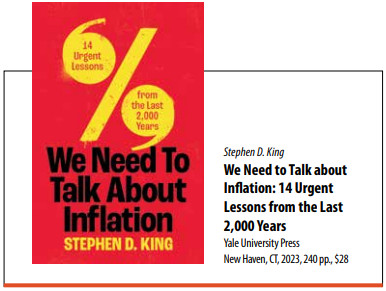Alas, the 1970s seem freshly relevant. Energy supplies are once more in doubt. The international order is yet again straining at the seams. Even the music is making a comeback.
Earnest Jackson’s 1975 funk song “Inflation” has suddenly found its moment: “Inflation,” he implores, “why don’t you get out the nation?” As much of the world confronts the worst inflation in nearly five decades, readers asking the same question would do well to turn to economist Stephen D. King’s new book.
King contends that our current inflationary moment is not primarily the product of a few shocks—pandemic-induced supply chain snarls or Russia’s invasion of Ukraine—but rather systemic problems in economic policy in recent years. Central banks, he argues, adopted frameworks that bias them toward inflation; quantitative easing, at first a last-ditch effort, became “totally addictive”; policymakers believed “their own anti-inflation credibility more or less guaranteed that inflation expectations would remain well behaved.” Moreover, he worries that central banks are far less independent than they appear and subject to pressure to do the bidding of fiscal authorities.
These points are of course contestable, and the argument perhaps lacks empathy for the challenges of real-time policymaking during a once-in-a-century pandemic. Nevertheless, King makes his case with verve, in the process delineating the pernicious effects of inflation and underscoring the absurdity of thinking it could never reappear in advanced economies.
After all, inflation has a long history, one that policymakers would do well to heed. King touches on some of the more memorable examples: French assignats, US greenbacks during the Civil War, Weimar’s hyperinflation. We also read about Roman coinage, medieval debasement, and, as to be expected, the 1970s. We even get to relive very recent history, as this hot-off-the-press book discusses Britain’s mini-budget crisis. These anecdotes form a series of snapshots that liven and inform the narrative, though readers seeking a systematic treatment of inflation over the past two millennia will need to look elsewhere.
As for King’s lessons and recommendations, most are quite sensible. Inflation tempts governments; it has massive distributional consequences that can be unfair and undemocratic; price and wage controls, while superficially appealing, are bad in theory and worse in practice. Inflation must be tackled, head-on and without hesitation.
Some of the forward-looking takeaways, however, would benefit from further explanation. For instance, which “rules-based” policy framework does he favor? Precisely what does King mean when he calls for “monetary dominance” over fiscal policy?
The most important lesson, however, is abundantly clear: monetary history matters. Right now, the historical discussion is properly about the dangers of inflation and the need to respond vigorously. Central bankers seem to have gotten the message, raising rates at a rapid clip. As we confront the challenges of inflation, the trick will be to not forget about the perils of deflation. After all, history is replete with examples of the pain caused by declining prices. Let us hope that, a few years from now, we do not suddenly find ourselves in need of urgent lessons again, this time on deflation.
Opinions expressed in articles and other materials are those of the authors; they do not necessarily reflect IMF policy.









